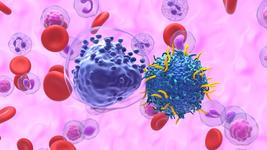Clinical Update: EdiGene Enrols First Patient in Phase 1 Trial for Transfusion-Dependent Beta Thalassemia
CMN Intelligence - The World’s Most Comprehensive Intelligence Platform for CRISPR-Genomic Medicine and Gene-Editing Clinical Development
Providing market intelligence, data infrastructure, analytics, and reporting services for the global gene-editing sector. Read more...
Last week, EdiGene, a global clinical-stage biotechnology company with offices throughout China and in Massachusetts, US, announced that it had enroled the first patient in its Phase 1 trial for ET-01 for transfusion-dependent beta thalassemia.
In the same press release, the company also disclosed that it had activated one of the trial’s investigational sites, at Nanfang Hospital of Southern Medical University in Guangzhou, Guangdong Province, China.
ET-01 is developed as an ex vivo autologous haematopoietic stem/progenitor cell (HSPC) therapy that is gene-edited to express foetal haemoglobin (HbF).
The strategy behind ET-01 is that HbF expression will compensate for the lack of functional adult haemoglobin seen in beta thalassemia, which may arise from one of >200 known mutations in the haemoglobin subunit beta (HBB) gene (See Fact Box).
Beta thalassemia and foetal haemoglobin
Beta thalassemia belongs to a group of diseases known as the thalassemias, which are characterised by haemoglobin deficiency. HbF is highly expressed and critical during foetal development, and is then rapidly suppressed early in life. Reactivation of HbF expression has emerged as an attractive strategy to treat the symptoms of beta thalassemia (and the related group of sickle cell diseases).
A number of clinical trials investigating various gene-editing approaches to reactivate HbF are underway, and you can read about a selection of these in an earlier clinical trial update.
CRISPR-edited patient-derived cells that express foetal haemoglobin
In the case of ET-01, HbF is reactivated by CRISPR-Cas9-mediated disruption of the BCL11A-erythroid enhancer. Specifically, peripheral blood mononuclear cells are isolated from thalassemia patients, these are then enriched for CD34+ cells (i.e. HSPCs), which are then genome-edited using CRISPR-Cas9.
BCL11A (or BAF Chromatin Remodeling Complex Subunit BCL11A) is a potent repressor of HbF expression and disrupting the BCL11A gene thus leads to reactivation of HbF in the genome-edited cells.
Beyond its role in negatively regulating HbFexpression, BCL11A is also heavily involved in B lymphocyte maturation and haematopoeitic stem cell renewal. Previous research by others has found that the erythroid enhancer present in the BCL11A gene sequence is required in erythroid but not in B-lymphoid cells for BCL11A expression. Therefore, the rationale with specifically editing the BCL11A erythroid enhancer is to reactivate HbF while minimising any impact on BCL11A’s non-erythroid haematopoietic functions.
China's first gene-edited therapy candidate
ET-01 is the first gene-editing investigational therapy and the first HSPC-based investigational therapy with IND application approval by China’s National Medical Products Administration (NMPA). The ET-01 trial is an open-label single-arm study designed to assess the safety and efficacy in patients with transfusion-dependant beta-thalassemia, which is a severe form of the disease.
The trial will include thalassemia patients between 6 and 35 years of age, and recruited participants will receive ET-01 as an intravenous infusion after a conditioning regimen to destroy existing haemoglobin-deficient HSPCs.
Primary outcome measures include parameters related to safety and adverse events, while secondary outcome measures include measurements of total haemoglobin levels, foetal haemoglobin levels and need for blood transfusions.
You can read our previous coverage on beta thalassemia here. For a complete overview of current gene editing clinical trials, check out CRISPR Medicine News' Clinical Trials Database.
Tags
ArticleNewsin vivoBeta ThalassemiaTransfusion-Dependent Beta Thalassemia, TDTBlood diseaseCRISPR-CasCas9EdiGene, Inc.TrialsClinical
CLINICAL TRIALS
Sponsors:
Base Therapeutics (Shanghai) Co., Ltd.
Sponsors:
Base Therapeutics (Shanghai) Co., Ltd.







